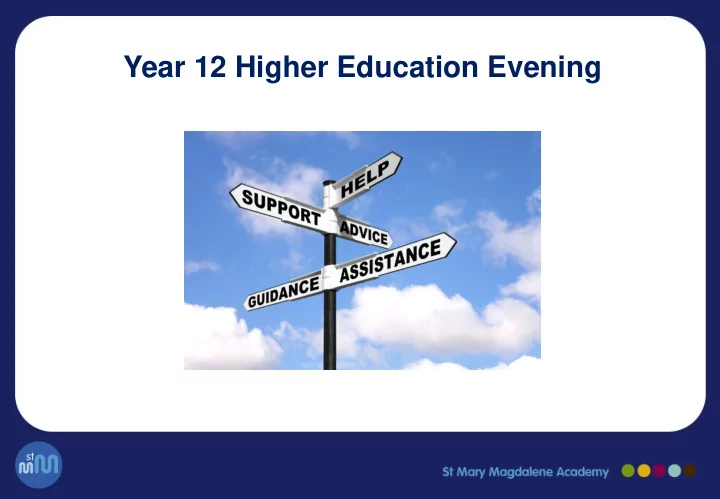

Year 12 Higher Education Evening
Year 12 Higher Education Evening ‘To Do’ List Key Dates March to end of Summer term Research Universities using ‘ Unifrog ’ & Book Open Days April to June Begin work on Personal Statement July-August Refine Personal Statement and gather ‘other information’ for UCAS 7 September Final draft of Personal Statement ready 15 October UCAS deadline for Oxbridge and Medics 31 October Pre-interview assessments for BMAT etc. 7 December General Applications to UCAS completed 15 January Final UCAS deadline 6pm
Year 12 Higher Education Evening www.opendays.com
Year 12 Higher Education Evening ‘To do’ List March to end of Summer term Research Higher Apprenticeships ( The Times Guide to Elite Apprenticeships is a good starting point) April to June Begin work on CV and Personal Statement July-August Refinement of CV and Personal Statement 7 September Final draft of CV and Personal Statement ready
I don’t know How do I even What do I write where to look for start? in a personal courses… statement? What extra courses can I do to help What are the entry with my university Which requirements application? for…..? Universities do this course? I can’t remember I want to apply to all the extra Oxbridge, I don’t have curricular things I a clue about any of the colleges… have done
“ Unifrog makes it easy for students to see how their grades will impact on where they can go. Very useful in terms of motivation!” “ Unifrog provides a onestop-shop for information that is often hard to find, allowing students and families to make better informed decisions about where to apply”
Enter a broad subject area that you are interested in. If you know the exact course you wish to study, you can enter that too.
You can rank and filter courses to narrow and personalise your search criteria. Use the filters to only show courses which suits your needs. For example you may wish to only see courses at Russell Group universities.
The map at the top of the next screen shows you the location of the universities that are on your shortlist, as well as your location (blue marker).
The Shortlist has lots more detailed information; make sure you scroll down to see it all.
Remember you can make as many Shortlists as you like, and can view them any time by clicking on the Shortlist button on the main dashboard.
Once you are happy with your Shortlists you can finalise your course choices by clicking on the UK Top 5 tool from the main dashboard. This allows you to select your favourite 5 choices from all your Shortlists.
Personal Statements • An easy way to structure and manage the development of your best personal statement. • A clear template as well as hints, tips and guidance. • Students and teachers work towards finalising the personal statement, with all feedback, notes and comments easily viewed and stored in one place.
The tool splits your Personal Statement into three sections. You can complete these in any order and come back to each section as many times as you like.
At the top of each section you will see some prompts in green text. Each one expands to show an example.
On the Personal Statement homepage you can see if a teacher has written any comments within your text or left feedback at the bottom.
I decided to do an Extended Project Qualification (EPQ), to develop my ability to work independently, and to grow my interests in English Literature. I examined how Coleridge's and Byron's works 'Kubla Khan' and 'Don Juan' respectively contribute to our understanding of the 'Romantic' movement in literature and the arts. These are two of my favourite works by two of my favourite authors, so it was easy for me to immerse myself in studying the poems. One thing I particularly enjoyed was the space I had to read around the subject - as well as the primary texts, I studied how these works were received by the authors' contemporaries. To source material I travelled on my own to a nearby town to a specialist library.
MOOCs Massive Open Online Courses • A MOOC is an online university short course aimed at making higher education more accessible to more people. • Gives the opportunity to extend learning outside the A Level syllabus. • Unifrog allows you to search for MOOCs, which are run by various universities.
Year 12 Higher Education Evening The keys to success: • Organisation • Responsibility • Meeting Deadlines • Proactivity
Year 12 Higher Education Evening Some Universities are more ‘Competitive’: Bath Nottingham Bristol Liverpool UCL Birmingham King’s Coutauld Institute Durham Leeds Imperial Warwick LSE Exeter Edinburgh St Andrews Manchester
Year 12 Higher Education Evening Individual Engagement and Course Readiness • Informed opinion (Masterclasses/Further Reading/MOOCs) • Extended Writing • External Engagement (Society Lectures/volunteering) • Work Experience
Year 12 Higher Education Evening Considering Oxbridge? • Reasons for choosing- Course over University • Colleges and the ‘pool’ • GCSE results and pre-tests key to initial selection • Don’t over invest • Remember the early deadline
Year 12 Higher Education Evening Medical School • Medical Schools- spread the ‘risk’ • Consider alternative careers too • UKCAT and BMAT • Consider what experiences count most Law • There are different routes into Law • LNAT • Consider evidence of ‘engagement’, essay precision and work experience
Recommend
More recommend